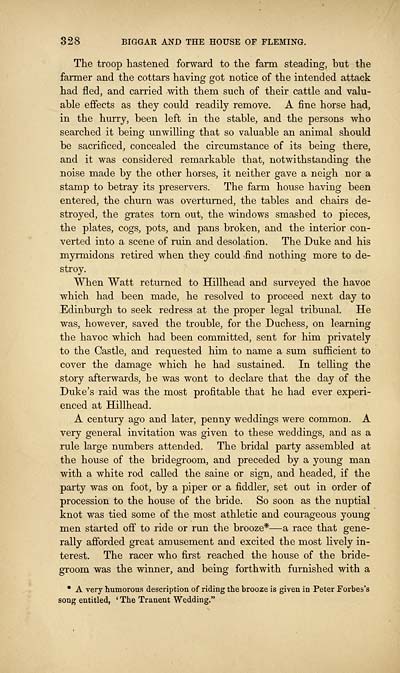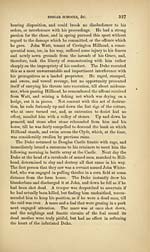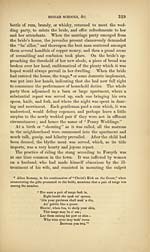Biggar and the House of Fleming
(358) Page 340
Download files
Complete book:
Individual page:
Thumbnail gallery: Grid view | List view

328 BIGGAR AND THE HOUSE OF FLEMING.
The troop hastened forward to the farm steading, but the
farmer and the cottars having got notice of the intended attack
had fled, and carried with them such of their cattle and valu-
able effects as they could readily remove. A fine horse had,
in the hurry, been left in the stable, and the persons who
searched it being unwilling that so valuable an animal should
be sacrificed, concealed the circumstance of its being there,
and it was considered remarkable that, notwithstanding the
noise made by the other horses, it neither gave a neigh nor a
stamp to betray its preservers. The farm house having been
entered, the churn was overturned, the tables and chairs de-
stroyed, the grates torn out, the windows smashed to pieces,
the plates, cogs, pots, and pans broken, and the interior con-
verted into a scene of ruin and desolation. The Duke and his
myrmidons retired when they could find nothing more to de-
stroy.
When Watt returned to Hillhead and surveyed the havoc
which had been made, he resolved to proceed next day to
Edinburgh to seek redress at the proper legal tribunal. He
was, however, saved the trouble, for the Duchess, on learning
the havoc which had been committed, sent for him privately
to the Castle, and requested him to name a sum sufficient to
cover the damage which he had sustained. In telling the
story afterwards, he was wont to declare that the day of the
Duke's raid was the most profitable that he had ever experi-
enced at Hillhead.
A century ago and later, penny weddings were common. A
very general invitation was given to these weddings, and as a
rule large numbers attended. The bridal party assembled at
the house of the bridegroom, and preceded by a young man
with a white rod called the saine or sign, and headed, if the
party was on foot, by a piper or a fiddler, set out in order of
procession to the house of the bride. So soon as the nuptial
knot was tied some of the most athletic and courageous young
men started off to ride or run the brooze* — a race that gene-
rally afforded great amusement and excited the most lively in-
terest. The racer who first reached the house of the bride-
groom was the winner, and being forthwith furnished with a
■ A very humorous description of riding the brooze is given in Peter Forbes's
song entitled, ' The Tranent Wedding."
The troop hastened forward to the farm steading, but the
farmer and the cottars having got notice of the intended attack
had fled, and carried with them such of their cattle and valu-
able effects as they could readily remove. A fine horse had,
in the hurry, been left in the stable, and the persons who
searched it being unwilling that so valuable an animal should
be sacrificed, concealed the circumstance of its being there,
and it was considered remarkable that, notwithstanding the
noise made by the other horses, it neither gave a neigh nor a
stamp to betray its preservers. The farm house having been
entered, the churn was overturned, the tables and chairs de-
stroyed, the grates torn out, the windows smashed to pieces,
the plates, cogs, pots, and pans broken, and the interior con-
verted into a scene of ruin and desolation. The Duke and his
myrmidons retired when they could find nothing more to de-
stroy.
When Watt returned to Hillhead and surveyed the havoc
which had been made, he resolved to proceed next day to
Edinburgh to seek redress at the proper legal tribunal. He
was, however, saved the trouble, for the Duchess, on learning
the havoc which had been committed, sent for him privately
to the Castle, and requested him to name a sum sufficient to
cover the damage which he had sustained. In telling the
story afterwards, he was wont to declare that the day of the
Duke's raid was the most profitable that he had ever experi-
enced at Hillhead.
A century ago and later, penny weddings were common. A
very general invitation was given to these weddings, and as a
rule large numbers attended. The bridal party assembled at
the house of the bridegroom, and preceded by a young man
with a white rod called the saine or sign, and headed, if the
party was on foot, by a piper or a fiddler, set out in order of
procession to the house of the bride. So soon as the nuptial
knot was tied some of the most athletic and courageous young
men started off to ride or run the brooze* — a race that gene-
rally afforded great amusement and excited the most lively in-
terest. The racer who first reached the house of the bride-
groom was the winner, and being forthwith furnished with a
■ A very humorous description of riding the brooze is given in Peter Forbes's
song entitled, ' The Tranent Wedding."
Set display mode to:
![]() Universal Viewer |
Universal Viewer | ![]() Mirador |
Large image | Transcription
Mirador |
Large image | Transcription
Images and transcriptions on this page, including medium image downloads, may be used under the Creative Commons Attribution 4.0 International Licence unless otherwise stated. ![]()
| Histories of Scottish families > Biggar and the House of Fleming > (358) Page 340 |
|---|
| Permanent URL | https://digital.nls.uk/94843578 |
|---|
| Description | A selection of almost 400 printed items relating to the history of Scottish families, mostly dating from the 19th and early 20th centuries. Includes memoirs, genealogies and clan histories, with a few produced by emigrant families. The earliest family history goes back to AD 916. |
|---|

